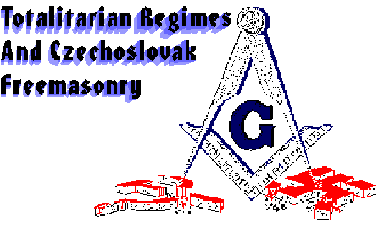

Jiri Syllaba
Past Sovereign Grand Commander, Supreme Council, 33, Czech Republic
It is common knowledge that Fascism, Nazism, and Communism tried to liquidate European Freemasonry not only in their native countries, but also in all the occupied lands. I am able, as an eye witness to all these totalitarian regimes, to give testimony, in providing proof and unforgettable evidence of their pursuit and persecution of Masons.
Of the 1,500 total Masons in the Czech lands, only 640 survived the six years of Nazi occupation from 1939 to 1945. Following the 41 years of Communist rule from 1948 to 1989, surviving members of Czech Lodges dwindled down to 28 survivors. Initiated in a regular Lodge Narod (Nation) in 1926, I can offer true evidence of what had happened after 1939 in my native country.
Several Czech Freemasons were arrested by the Gestapo (Nazi Secret State Police), imprisoned, and thereafter frequently transported to various concentration camps where many of them died, either in the camps or shortly following release from the effects of long imprisonment. Other Freemasons were executed; four members from our Narod Lodge alone, including Bros. Naprstek, Pesl, and Smakal together with his wife. Brethren of other Czech Lodges were also persecuted and a number executed. From my mother Lodge, Narod, I am the last living Brother.
I was arrested by the Gestapo in 1940 and imprisoned incommunicado in solitary confinement. No one can imagine what solitary confinement signified at that time, just after the fall of Paris, when only unprepared England stood alone to resist the superior German army. Isolated and alone in my cell, without any books or newspapers, I was also without any information of what the Gestapo knew of my activities and unaware how long my imprisonment would last. By chance, I found a sunken pin in a crevice in the floor. Stabbing my finger, I drew drops of blood and was thus able to secretly write some poems on toilet paper, these to be later recovered after the war and published in a book containing poems written by me and other prisoners.
In 1940, the situation for political prisoners was at times somewhat easier than was the case in later years. I was cross-examined for eight weeks by a German physician before finally being released. However, in 1944 I was arrested again and imprisoned until the end of the second world war. Chances of an early release were more favorable in 1944 and 1945; however, the examining commissioner assigned to me was cruel and vengeful. Within weeks, I was transported from Prague together with other prisoners to a prison in northern Bohemia called the "Small Fortress."
The Gestapo had used this 200-year-old prison for political prisoners and also as a transit station from which many prisoners would be transported to larger concentration camps in Germany or Poland. But even at the "Small Fortress" a scaffold had been erected on which prisoners were executed, 52 by the war's end in May 1945.
I shall never forget the cold evening chill when we entered the "Small Fortress." We stood silently for an hour until a group of SS men came to form two rows through which we had to file to be beaten with canes. One prisoner behind me, an English soldier, whispered to me "Nobody in England will believe me how the Nazi guards have treated us."
We were driven into a huge cold and damp cell, 400 prisoners in all. Drops of cold water fell from the ceiling, so naturally we could not sleep and had to keep walking throughout the night. The next day, prisoners were assigned to either larger or smaller cells. I was placed into a cell with 60 other prisoners. This cell had one lavatory.
Soon the "Small Fortress" was overcrowded with the arrival of new prisoners. The water supply became restricted, making personal hygiene extremely difficult. Food was inadequate, meager and monotonous, resulting in rapid weight loss, usually 44 pounds in the first month alone.
Daily work details were sent out under escort, and even old and ill prisoners were forced to perform heavy manual work with several of them dying of exhaustion or typhoid and dysentery-related diseases.
The highest rates of mortality were reached in April 1945 when prisoners arrived from Auschwitz, a concentration camp in Poland, infecting a large number of prisoners with exanthematic typhus. As many as 20 prisoners would die on one day, some in my arms. Within days, several hundred prisoners had died. By this time, I had become one of the imprisoned physicians. It was remarkable that only two of the physicians had died of exanthematic fever notwithstanding the maximum exposure to which they were exposed.
On the 5th of May, the Nazi SS men, together with their chief, suddenly left the "Small Fortress." A committee of the Red Cross promptly started a sanitary service, so I stayed on for another week to be of help.
Following the Prague uprising, I returned home on May 12th to an anxiously waiting wife who had been injured by a door knocked out by a bomb that had fallen on the house where we lived. The bomb fell during an air raid in February of 1945. The two higher floors of the building were destroyed, having crushed through two ceilings of our flat and blowing out all our doors and windows. We consider it a miracle that my wife was not killed and that I had escaped with my life by having survived the terrible time in prison.
Perhaps we were under the protection of the Great Architect of the Universe.